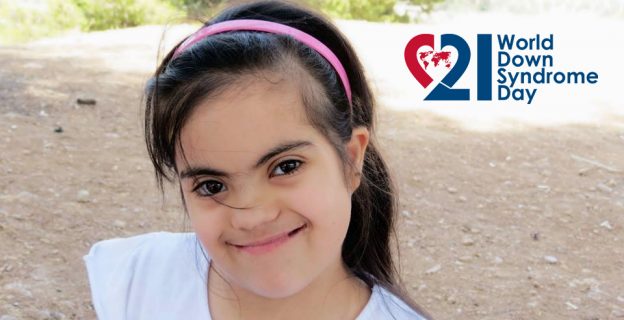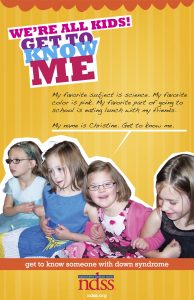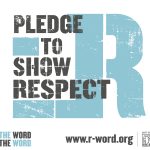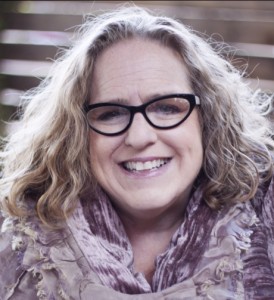
Parenting  Sophie wanted me to read my book to her classmates. That wasn’t possible — it’s a long book aimed at adults, and the material isn’t entirely appropriate for middle school students. But she was on the right track. There are some terrific books that can be used as a jumping-off point for a conversation.
My favorite book for preschool and the earliest grades — which I’ve given to many friends — is My Friend Isabelle by Eliza Woloson. (Fun fact: Eliza’s daughter Isabelle was just accepted to college!) The book does not explain Down syndrome, but it opens the door for you to do it.
I don’t have a book about Down syndrome to recommend for middle readers, but there are two fantastic books about disability that can easily be used as conversation starters. Out of My Mind by Sharon Draper explores the importance of communication. And Wonder by R.J. Palacio focuses on physical disability in a meaningful, universal way kids can really relate to.
Sophie wanted me to read my book to her classmates. That wasn’t possible — it’s a long book aimed at adults, and the material isn’t entirely appropriate for middle school students. But she was on the right track. There are some terrific books that can be used as a jumping-off point for a conversation.
My favorite book for preschool and the earliest grades — which I’ve given to many friends — is My Friend Isabelle by Eliza Woloson. (Fun fact: Eliza’s daughter Isabelle was just accepted to college!) The book does not explain Down syndrome, but it opens the door for you to do it.
I don’t have a book about Down syndrome to recommend for middle readers, but there are two fantastic books about disability that can easily be used as conversation starters. Out of My Mind by Sharon Draper explores the importance of communication. And Wonder by R.J. Palacio focuses on physical disability in a meaningful, universal way kids can really relate to.
 The National Down Syndrome Society has put together a program called the “Get to Know Me” poster and lesson plan. You can download the poster, lesson plan, and question-and-answer sheets from the NDSS site.
A vocabulary lesson may also be in order.
The National Down Syndrome Society has put together a program called the “Get to Know Me” poster and lesson plan. You can download the poster, lesson plan, and question-and-answer sheets from the NDSS site.
A vocabulary lesson may also be in order.  I was on campus for about three minutes one day, before I heard a kid use the word “retarded.” I stopped him, and we had a quick chat. He had no idea it was a “bad” word.
The “Spread the Word to End the Word” campaign has a website stocked with resources for teaching kids about appropriate language and why it matters. Encourage your child's classmates to take the pledge.
I was on campus for about three minutes one day, before I heard a kid use the word “retarded.” I stopped him, and we had a quick chat. He had no idea it was a “bad” word.
The “Spread the Word to End the Word” campaign has a website stocked with resources for teaching kids about appropriate language and why it matters. Encourage your child's classmates to take the pledge.
Speaking to Your Child's Classmates About Down Syndrome
My daughter Sophie is almost fourteen. She has Down syndrome. She’s in eighth grade and has been mainstreamed since her earliest preschool days. A few weeks ago, she invited me to speak at Career Day at her middle school. She wanted me to talk about the book I wrote about her. Turns out, what Sophie really wanted was for me to explain Down syndrome to the other kids at her school. I was floored. And I felt terrible. Since Sophie was born, her father and I have been so focused on getting her what she needs — government services, therapies, heart surgery, more heart surgery, the right teachers, the right IEPs, spots on the cheerleading team and in drama class — that it had never occurred to me that her peers had needs, too. Namely, they needed to know what was up with Sophie. When Sophie started middle school, I urged the school to start a Best Buddies program — and they did — but it didn’t occur to me that no one ever talked about why and how these kids were different. Or that it mattered. Up till the day Sophie asked, I’d been proud that we hadn’t made a big deal out of Down syndrome at school. Sophie was just Sophie, I figured. The kids will accept her as is. No need for explanation. Sophie begged to differ, and as soon as she did, I saw her world through her eyes. Later, when I spoke to her classmates, I saw it through their eyes as well. They were curious but polite. Standoffish for a reason, I realize now. I screwed up. I’m still finding my own footing on this one, but I’ve been gathering resources for Sophie’s high school experience (I’ve got till August!), and I found some good ones for younger kids, too, that I’d like to share here. Every kid, every family, every school, and every peer group is different. But across the board, the law prohibits school staff from discussing a child’s particular health issues with other students. So this really is up to parents. Here’s a list I wish I’d had several years ago.Read a Book
 Sophie wanted me to read my book to her classmates. That wasn’t possible — it’s a long book aimed at adults, and the material isn’t entirely appropriate for middle school students. But she was on the right track. There are some terrific books that can be used as a jumping-off point for a conversation.
My favorite book for preschool and the earliest grades — which I’ve given to many friends — is My Friend Isabelle by Eliza Woloson. (Fun fact: Eliza’s daughter Isabelle was just accepted to college!) The book does not explain Down syndrome, but it opens the door for you to do it.
I don’t have a book about Down syndrome to recommend for middle readers, but there are two fantastic books about disability that can easily be used as conversation starters. Out of My Mind by Sharon Draper explores the importance of communication. And Wonder by R.J. Palacio focuses on physical disability in a meaningful, universal way kids can really relate to.
Sophie wanted me to read my book to her classmates. That wasn’t possible — it’s a long book aimed at adults, and the material isn’t entirely appropriate for middle school students. But she was on the right track. There are some terrific books that can be used as a jumping-off point for a conversation.
My favorite book for preschool and the earliest grades — which I’ve given to many friends — is My Friend Isabelle by Eliza Woloson. (Fun fact: Eliza’s daughter Isabelle was just accepted to college!) The book does not explain Down syndrome, but it opens the door for you to do it.
I don’t have a book about Down syndrome to recommend for middle readers, but there are two fantastic books about disability that can easily be used as conversation starters. Out of My Mind by Sharon Draper explores the importance of communication. And Wonder by R.J. Palacio focuses on physical disability in a meaningful, universal way kids can really relate to.
Watch a Video
The Down Syndrome Guild of Greater Kansas City has put together a wonderful 13-minute video, Just Like You, explaining Down syndrome, including some super basic facts about chromosomes.Teach a Lesson
 The National Down Syndrome Society has put together a program called the “Get to Know Me” poster and lesson plan. You can download the poster, lesson plan, and question-and-answer sheets from the NDSS site.
A vocabulary lesson may also be in order.
The National Down Syndrome Society has put together a program called the “Get to Know Me” poster and lesson plan. You can download the poster, lesson plan, and question-and-answer sheets from the NDSS site.
A vocabulary lesson may also be in order.  I was on campus for about three minutes one day, before I heard a kid use the word “retarded.” I stopped him, and we had a quick chat. He had no idea it was a “bad” word.
The “Spread the Word to End the Word” campaign has a website stocked with resources for teaching kids about appropriate language and why it matters. Encourage your child's classmates to take the pledge.
I was on campus for about three minutes one day, before I heard a kid use the word “retarded.” I stopped him, and we had a quick chat. He had no idea it was a “bad” word.
The “Spread the Word to End the Word” campaign has a website stocked with resources for teaching kids about appropriate language and why it matters. Encourage your child's classmates to take the pledge.



